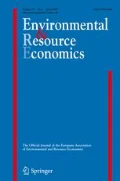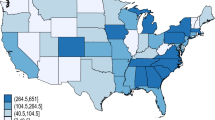Abstract
This paper analyzes differences in firms’ responsiveness to PROPER, Indonesia’s public disclosure program for industrial pollution control. The overall effectiveness of this program at achieving emissions reductions and its low regulatory costs have earned it a good reputation around the world. PROPER had no deterrents or incentives other than those that arose indirectly from publicly disclosing information about the environmental performances of firms. We analyzed plant-level data to relate short- and longer-term environmental responses to facility characteristics. The results revealed that foreign-owned firms were consistently more likely to respond to the environmental rating scheme, compared to private domestic firms. This is a clear and important insight with consequences for a number of issues, such as understanding the pollution haven debate. Also, firms located in densely populated regions, particularly in Java, responded more positively to the public disclosure of PROPER ratings. The main observed effect was however given by the initial level of environmental performance of firms. Those firms that had bad environmental performance records felt pressure to improve, but if the initial abatement steps had already been taken, the incentives to improve further appeared to diminish.
Similar content being viewed by others
Abbreviations
- PROPER:
-
Indonesia’s Program for Pollution Control Evaluation and Rating
- BAPEDAL:
-
Indonesia’s National Environmental Regulator
References
Afsah S, Ratunanda D (1999) Environmental performance measurement and reporting in developing countries: the case of Indonesia’s program for pollution control evaluation and rating (PROPER). In: Bennett M, James P, Klinkers L (eds) Sustainable measures: evaluation and reporting of environmental and social performance. Greenleaf Publishing Ltd, Sheffield
Afsah S, Vincent J (2000) Putting pressure on polluters: Indonesia’s PROPER program. In: Angel D, Rock MT (eds) Asia’s clean revolution: industry growth and the environment. Greenleaf Publishing Ltd, Sheffield, p 157
Afsah S, Laplante B, Makarim N (1995) Programme-based pollution control management: the Indonesian PROKASIH programme. Policy Research working paper No. 1602, World Bank, Washington, DC
Afsah S, Laplante B, Wheeler D (1997) Regulation in the information age: Indonesian public information program for environmental management. Research paper, World Bank, Washington, DC
Arora S, Cason T (1999) Do community characteristics influence environmental outcomes? Evidence from the toxics release inventory. South Econ J 65: 691–716
Bernard A, Sjöholm F (2003) Foreign owners and plant survival. Working paper 10039, National Bureau of Economic Research, Cambridge, MA
Blackman A, Afsah S, Ratunda D (2004) How do public disclosure pollution control programs work? Evidence from Indonesia. Hum Ecol Rev 11: 235–246
Central Bureau of Statistics (CBS) [Indonesia], State Ministry of Population, Ministry of Health, Macro International Inc. (MI) (1998) Indonesia demographic and health survey 1997, CBS MI, Calverton, Maryland
Coase R (1960) The problem of social cost. J Law Econ 3: 1–44
Dasgupta S, Laplante B, Mamingi N (2001) Pollution and capital markets in developing countries. J Environ Econ Manage 42: 310–335
Dasgupta S, Wang H, Wheeler D (2007) Disclosure strategies for pollution control. In: Tietenberg T, Folmer H (eds) The international yearbook of environmental and resource economics. Edward Elgar Publishing, Northampton, MA, p 93
Eskeland G, Harrison A (2003) Moving to Greener pastures? Multinationals and the pollution Haven hypothesis. J Dev Econ 70: 1–24
Farrukh I, James WE (2002) Deregulation and development in Indonesia. Praegar Publishers, Westport, CT
Foulon J, Lanoie P, Laplante B (2002) Incentives for pollution control: regulation or information. J Environ Econ Manage 44: 169–187
García JH, Sterner T, Afsah S (2007) Public disclosure of industrial pollution. The PROPER approach for Indonesia?. Environ Dev Econ 12: 739–756
Garvie D, Keeler A (1994) Incomplete enforcement with endogenous regulatory choice. J Public Econ 55: 141–162
Greene W (2003) Econometric analysis. Prentice Hall, New Jersey
Hamilton J (1995) Pollution as news: media and stock market reaction to the toxics release inventory data. J Environ Econ Manage 28: 98–113
Khanna M, Rose W, Quimio H, Bojilova D (1998) Toxic release information: a policy tool for environmental protection. J Environ Econ Manage 36: 243–266
Konar S, Cohen M (1997) Information as regulation: the effect of community right to know laws on toxic emissions. J Environ Econ Manage 32: 109–124
Lanoie P, Laplante B, Roy M (1998) Can capital markets create incentives for pollution control?. Ecol Econ 26: 31–41
MacAndrews C (1994) The Indonesian environmental impact management agency (BAPEDA): its role, development and future. Bull Indones Econ Stud 30: 85–103
Millimet DL, List JA (2005) The case of the missing pollution Haven hypothesis. J Regul Econ 26: 239–262
Pargal S, Wheeler D (1996) Informal regulation of industrial pollution control in developing countries: evidence from Indonesia. J Polit Econ 104: 1314–1326
Portney P (2000) Environmental problems and policy 2000–2050. J Econ Perspect 14: 199–206
Sterner T (2003) Policy instruments for environmental and natural resource management. RFF Press, Washington, DC
Stiglitz JE (2002) Information and the change in the paradigm in economics. Am Econ Rev 92: 460–501
Takii S (2004) Productivity differentials between local and foreign plants in Indonesian manufacturing. World Dev 32: 1957–1969
Tietenberg TH (1998) Disclosure strategies for pollution control. Environ Resour Econ 11: 587–602
Treverton GF, Levaux HP, Wolf C (1998) Commercial power centers in emerging markets. Rand Monograph Report, Washington, DC
World Bank (1993) The east Asian miracle: economic growth and public policy. World Bank policy research report, Washington
World Bank (1994) Indonesia: environment and development. A World Bank country study, Washington, DC
World Bank (2000) Greening industry: new roles for communities, markets and governments. Oxford University Press, New York
Author information
Authors and Affiliations
Corresponding author
Rights and permissions
About this article
Cite this article
García, J.H., Afsah, S. & Sterner, T. Which Firms are More Sensitive to Public Disclosure Schemes for Pollution Control? Evidence from Indonesia’s PROPER Program. Environ Resource Econ 42, 151–168 (2009). https://doi.org/10.1007/s10640-008-9211-2
Received:
Accepted:
Published:
Issue Date:
DOI: https://doi.org/10.1007/s10640-008-9211-2




